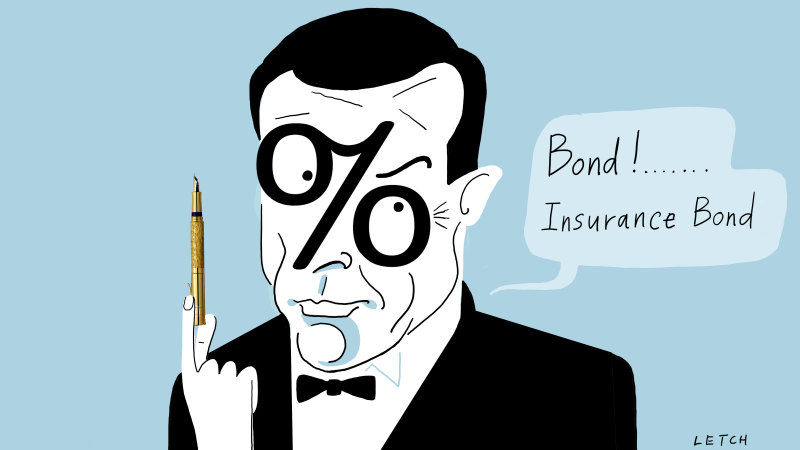Is it worth investing in bonds during retirement?
We are a self-funded retired couple in our 70s with $200,000 cash to invest. Would you please tell us about bonds, how and where to find them, and how to buy and sell them? Can we sell them before maturity and what return should we expect?
Books have been written on the topic!
Corporate bonds, i.e. issued by companies, can be bought and sold over the counter through firms such as FIIG Securities which has offices across the country. On its website, it provides a free eBook titled “The benefits of corporate bonds” and a list of some 600 bonds, mostly with yields to maturity currently in the range of 5 to 6 per cent. Note that a yield to maturity includes interest payments plus the difference between your purchase price and the face value of the bond. The minimum investment is $10,000.
The bond market is a sophisticated one in which amateurs can quickly become unhappy without good advice.Credit:Simon Letch
The Government’s Australian Office of Financial Management has a page on its website that points out that Australian Government bonds (AGBs) can only be bought over the counter by wholesale investors, or those with a minimum purchase of $500,000.
Retail investors need to go through a stockbroker (28 are listed) to buy securities known as “exchange-traded Australian Government Bonds” (eAGBs). There are two types: Treasury Bonds (eTBs) providing fixed interest payments, and Treasury Indexed Bonds (eTIBs) with interest payments linked to inflation. Each reflects the current value of a bond with a $100 face value.
I see the bond market as being a sophisticated one in which amateurs can quickly become unhappy without good advice. A low-risk approach is to buy bonds from reputable companies (corporate bonds generally pay higher rates than AGBs) that mature in two to three years. However, you can sometimes be better off with a bank term deposit.
Note that ASIC has warned about a number of fake Australian Government Bond investment offers, so stick to well-established brokers.
I am 72, reside in Fiji and hold both Australian and Fijian passports. I was born in Sydney and qualified and worked as a geologist in many countries, including 20 years of living and working in Australia. I do not have superannuation. Three of my children permanently reside and work in Australia on Australian passports. I now run my business in Savusavu, Vanua Levu. Would I qualify for an Australian age pension?
On the day you claim an age pension, you usually need to live here and have been an Australian resident for at least 10 years in total, with no break in residence for at least 5 of these years. Exceptions exist for countries with social security agreements, such as Italy and Greece, to cater to the large number of migrants from those countries.
A resident is either an Australian citizen, someone who holds a permanent residence visa, or a New Zealander holding a protected special category visa.
There’s no social security agreement with Fiji, so no age pension for you unless you move back here.
As you know, Anthony Albanese and Penny Wong are scooting around the Pacific, desperately trying to be better friends than China’s President Xi. Why not write a letter suggesting that a social security agreement with Fiji is one way to prove friendship, one which the Chinese are unlikely to emulate? You’ve got nothing to lose!
I retired in October 2019, at 56, with $659,000 in super which I transferred to a nationwide platform offered by a local adviser. I have not needed the money, so it is still in accumulation mode. As of today, there is still less than what I started with, roughly $650,000, so basically I have been going backwards. I have been living off my savings but this won’t last forever. Should I change super funds or take my money out and invest in Aussie shares or leave it and hope it goes up before I need it? I also own two rental properties and own my home with no debts.
Comparing this to other investments, the ASX All Ordinaries Price Index has risen 6pc since October 2016. If you add, say, 3 per cent a year in dividends after tax, and allow for fees, there would be a handy positive result in an equity index fund.
You are more likely invested in a balanced fund and we can see that, over three years to the end of January, as an example, Unisuper’s Balanced fund reported returns of 4.54 per cent a year or 14.2 per cent in total after investment fees and tax (but before account-based fees). As another example, Colonial First State’s First Sentier Balanced Fund made just 1.99pc pa over 3 years, or 6pc in total, again after ongoing fees but before member fees in its personal super fund.
In short, good balanced funds appear to show positive returns over 3 years, although it’s hard to get exact returns from October 2019 to this March. Either your chosen fund is a poor performer or the fees are wiping out the gains.
You can ask your adviser which it is or simply roll over to another super fund. Don’t waste your time with a poor performer.
- Advice given in this article is general in nature and is not intended to influence readers’ decisions about investing or financial products. They should always seek their own professional advice that takes into account their own personal circumstances before making any financial decisions.
If you have a question for George Cochrane, send it to Personal Investment, PO Box 3001, Tamarama, NSW, 2026. All letters answered.
Most Viewed in Money
From our partners
Source: Read Full Article


